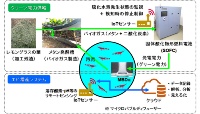Operating fuel cells with biogas, shrimp farming using renewable energy

Schematic diagram of shrimp farming system with biogas-powered fuel cells and IoT
(Source: Kogakuin University)
Kogakuin University will participate in a demonstration experiment of a shrimp farming system that utilizes renewable energy in Vietnam. Adopted by NEDO (New Energy and Industrial Technology Development Organization) for the "International Demonstration Project for Japanese Technology Contributing to Efficiency of Energy Consumption", and on November 3, a science and technology joint contract (ST) was signed between the implementers. signed.
The international project "Demonstration Research on Advanced Energy Saving Shrimp Farming System Using Local Biomass (Vietnam)" produces biogas by methane fermentation of unused local biomass and sludge from shrimp farming. The biogas is supplied to a solid oxide fuel cell (SOFC) to generate electricity, which is used as a power source to supply air to aquaculture ponds required for shrimp farming.
100 kg of lemongrass leaves (processing residue) after essential oil production and 1 m3 of shrimp farming sludge per day are put into the methane fermentation tank to generate 40 m3 of biogas per day. A low-cost resin tank is used for the methane fermentation tank. The power generation efficiency of SOFC is about 45% to 50%, which is more than double that of small gas engines.
In addition, the shrimp production system uses IoT to constantly monitor and adjust the water quality of the farming pond and farming-related equipment. In addition, by introducing a microbubble diffuser that increases the concentration of dissolved oxygen with fine bubbles, the production rate and growth rate of shrimp are increased, maximizing the amount of aquaculture production. IoT will also be used for SOFC operation management. About 500,000 shrimp are farmed per pond. It aims to start operations around 2024.
The implementation period is from November 1st to December 31st, 2025. Hiroyuki Keiso (Meguro-ku, Tokyo) will be the representative organization, and Kogakuin University, Kyushu University, Internet Initiative Japan, and Mitsubishi Research Institute will participate. Tien Giang Provincial People's Committee, Tien Giang Provincial Agriculture and Rural Development Department, and Tuan Hien shrimp farm (demonstration site) cooperate with local organizations.
In addition, as an advanced basic research for this project, Professor Yusuke Shiratori of Kogakuin University is conducting research on "local energy circulation that combines high-efficiency fuel cells and recycled biogas" in the "Science and Technology Research Partnership for Sustainable Development (SATREPS)". system construction” (2014-2020, Associate Professor at Kyushu University)






